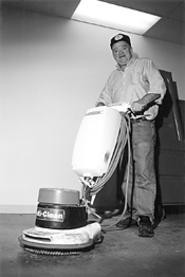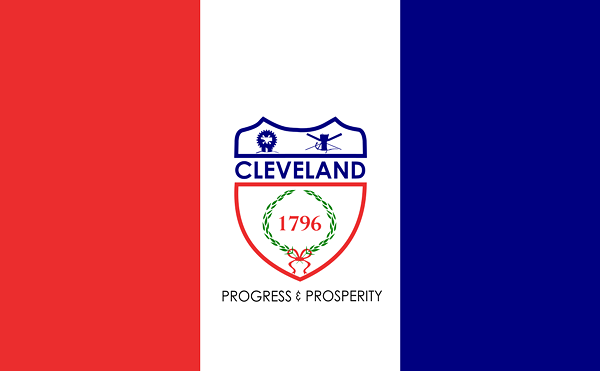His sensitive nature, combined with a gift for lifting heavy objects and handling power tools, did not go unappreciated. A group of astute nuns in search of a handyman were quick to snag him as their first paid employee. They were opening a soup kitchen and clothing drop-off center on West 25th Street, and they needed some muscle behind it. Called the West Side Catholic Center, it was a small operation.
Verhosek's job was supposed to be temporary, but like the center itself, it's lasted 25 years so far. The humble storefront gradually expanded to a staff of 30, with hundreds of volunteers and several buildings. And Verhosek, well, he went from a strapping man, age 39, to a really worn-out one, age 64.
"My legs and arms and shoulders are just killing me," the stocky, short-of-breath granddad declares, looking like he never wants to get up from the chair he's just set himself in. "When I get home, I'm dog-tired. It takes me 40 minutes to get out of the car."
Even his clothes -- flannel shirt worn shiny from many washings, lumpy sneakers covered in dust -- seem exhausted. Once part saint, he's now content with a spot in that lower rung of heaven reserved for gruff but lovable sorts.
Needy people, whom he used to embrace, tend to just make him crabby. "Last year, I was hoping I could retire and come back as a volunteer," he says. "Now I tell my wife, when I get outta here, I'm not gonna go back. I'm done with the place."
In his superhuman early days at the center, Verhosek was a godsend. Having recently had a heart-to-heart with his heavenly father at a parish retreat, he was soaring through life on a spiritual high.
"I really felt like it was a calling," he says of the job. "I'd worked for Sears as a stock boy in shipping and receiving, and at Pinkerton Security. It seems like all the jobs I did in my life really helped me at the center."
His brawny build, combined with a military-style crew cut that he had touched up every few weeks, kept the ex-cons and addicts on their best behavior when they stopped by for free peanut butter and jelly sandwiches.
He wasn't allergic to housework, either. With only a hot plate and a coffeepot at their disposal, the nuns served lunch to about 40 people each day, and they needed help with the cleanup. Verhosek scrubbed floors and washed dishes in a washtub out back, because the closet-sized kitchen didn't even have a sink.
The sisters could only pay him peasant wages, but he didn't mind. "I was on cloud nine for I don't know how many years. Even when I was troubled, I'd just wanna sit and relax and meditate. I'd come home and feel like a million bucks."
He made it his business to learn the names, real or made-up, of every boozer and babushka lady who came to the door. "We'd talk about the weather, whatever was on their minds," he recalls. "I started getting to know them."
He freely gave out cigarettes, until his wife told him it was getting expensive. He even surrendered his watch to a man who needed one for work. The guy ended up pawning it, which upset Verhosek a little, but he got over it.
With four kids to feed, the Verhoseks managed to make their paychecks stretch. "We had a little bit of savings that helped us along."
When an unexpected fifth child was born in 1981, things got tougher. His wife quit her job to stay home with the baby, and Verhosek moonlighted as a drapery installer. His older kids, who were in high school, took jobs at McDonald's. "Most of my kids paid for their weddings themselves," he remembers with pride. "My one daughter, she got married on our porch."
By 1982, the center had outgrown its storefront and moved across the street, to a remodeled former bowling alley. It would eventually serve more than 200 people every day, some of them seasonal workers like baseball vendors and longshoremen, some of them crack addicts barely old enough to vote.
Verhosek isn't sure exactly when his empathy well ran dry. Maybe he heard one too many hard-luck stories, or maybe he was tired of people asking him to bend the rules, just this once, about 57 times a day. His life blurred into one long stream of down-and-outers, bugging him for cigarettes as they slowly filed past. He stopped answering frantic after-hours knocks for food or clothing.
"I've even heard, 'Don't ask him. He won't help you.' A lot of them try to give you a guilt complex."
He still knows a few clients by name. Some he first got to know 25 years ago, and they still haven't quite gotten on their feet. Others went on the wagon, only to fall off a year or 10 later. "When they turn around and go back where they where, that's when it hurts the most," he says.
When he retires, he'll have a pension of a bad back, a bad heart, and cement pillars for legs. "His health is so failing him," says Terrie Garr, the center's volunteer coordinator. "He's just frustrated. He wants to be able to do everything, and he can't, and that's where his frustration is. But he's so good -- his work ethic is so good."
The next time He calls on Rudy, maybe the Lord could just ask him to read psalms or say the rosary. Some task the guy could perform propped up on a bunch of pillows, surrounded by his favorite people: the ones who don't ask him for a single thing.














